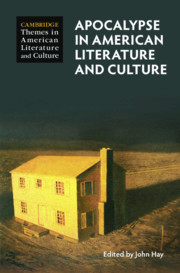Book contents
- Apocalypse in American Literature and Culture
- Cambridge Themes in American Literature and Culture
- Apocalypse in American Literature and Culture
- Copyright page
- Contents
- Figures
- Contributors
- Introduction The United States of Apocalypse
- Part I America as Apocalypse
- Part II American Apocalypse in (and out of) History
- Part III Varieties of Apocalyptic Experience
- Chapter 17 New History for a New Earth
- Chapter 18 W. E. B. Du Bois’s Apocalyptic Ambivalence
- Chapter 19 The Empty Cities of Urban Apocalypse
- Chapter 20 The Planetary Futures of Eco-Apocalypse
- Chapter 21 The Last Laughs of Doomsday Humor
- Chapter 22 The Catastrophic Endgames of Young Adult Literature
- Chapter 23 Apocalyptic Trauma and the Politics of Mourning a World
- Chapter 24 Posthuman Postapocalypse
- Further Reading
- Index
Chapter 18 - W. E. B. Du Bois’s Apocalyptic Ambivalence
from Part III - Varieties of Apocalyptic Experience
Published online by Cambridge University Press: 03 December 2020
- Apocalypse in American Literature and Culture
- Cambridge Themes in American Literature and Culture
- Apocalypse in American Literature and Culture
- Copyright page
- Contents
- Figures
- Contributors
- Introduction The United States of Apocalypse
- Part I America as Apocalypse
- Part II American Apocalypse in (and out of) History
- Part III Varieties of Apocalyptic Experience
- Chapter 17 New History for a New Earth
- Chapter 18 W. E. B. Du Bois’s Apocalyptic Ambivalence
- Chapter 19 The Empty Cities of Urban Apocalypse
- Chapter 20 The Planetary Futures of Eco-Apocalypse
- Chapter 21 The Last Laughs of Doomsday Humor
- Chapter 22 The Catastrophic Endgames of Young Adult Literature
- Chapter 23 Apocalyptic Trauma and the Politics of Mourning a World
- Chapter 24 Posthuman Postapocalypse
- Further Reading
- Index
Summary
This chapter recovers W. E. B. Du Bois’s unpublished novel “Scorn” (1905) to argue that it announces the political and temporal posture that structures much of Du Bois’s work: apocalyptic ambivalence. Apocalyptic ambivalence registers a skeptical attitude toward history’s celebration of grand gestures and dramatic transformations and instead trains its attention on the quotidian and mundane practices that might reconstruct social arrangements and reveal an otherwise unimaginable world. In this regard, apocalyptic ambivalence is a political position and registers a temporal logic and narrative approach that Du Bois would mobilize time and time again over the course of his expansive and multimedial oeuvre. Suggesting that Du Bois often made recourse to apocalyptic tropes and rhetoric – most notably in Black Reconstruction (1935) – this chapter locates “Scorn” as a text whose formal and generic contours stage a series of thwarted and deferred apocalyptic events only to offer the fulfillment of the apocalyptic promise in the world of interracial labor and an all-black education settlement. In so doing, “Scorn” shifts the idea of apocalypse away from world-ending devastation and toward the conditions of everyday life.
Keywords
- Type
- Chapter
- Information
- Apocalypse in American Literature and Culture , pp. 239 - 251Publisher: Cambridge University PressPrint publication year: 2020



